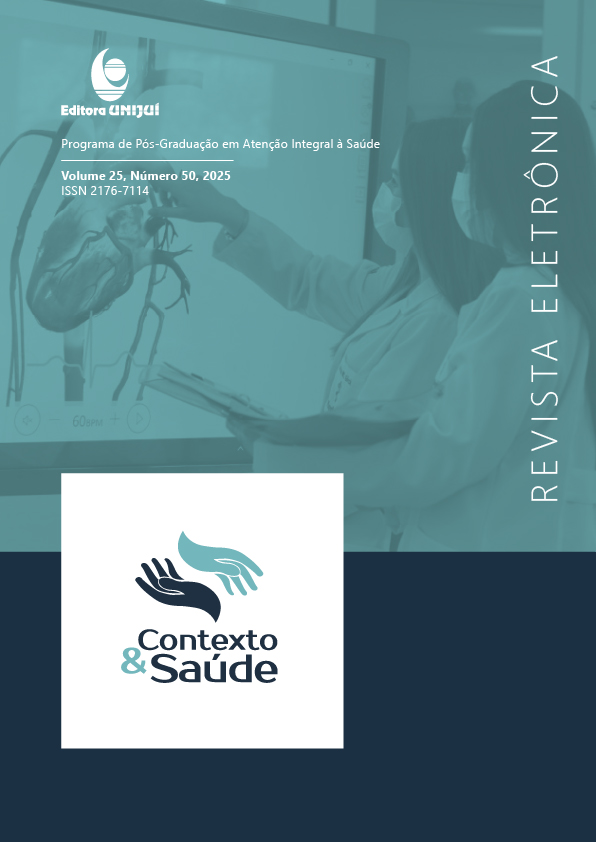Letramento em saúde dos graduandos de enfermagem
DOI:
https://doi.org/10.21527/2176-7114.2025.50.15313Palavras-chave:
Letramento em saúde, Estudantes de enfermagem, Educação em saúdeResumo
Objetivo: Identificar o letramento em saúde entre graduandos de enfermagem no último ano da graduação. Método: Trata-se de uma pesquisa transversal, de análise descritiva e abordagem quantitativa, utilizando o instrumento Health Literacy Questionnaire com graduandos de enfermagem do 9º e 10º semestres, com idade entre 18 e 60 anos, de ambos os sexos, em uma instituição privada de ensino do DF. A amostra contou com 67 participantes que aceitaram participar da pesquisa. Resultados: O estudo indica que mais da metade dos graduandos de enfermagem são do sexo feminino, não possuem curso técnico e têm idade até 40 anos. Entre as potencialidades em letramento em saúde, destacam-se a capacidade de encontrar boas informações sobre saúde e compreendê-las; entre as fragilidades, destaca-se a má administração do tempo para o autocuidado. Conclusão: Este estudo apresenta indícios sobre as condições de letramento em saúde dos graduandos, que no futuro serão fonte de conhecimento para diferentes populações, graças ao seu entendimento e domínio sobre o letramento em saúde. Isso possibilita a investigação para novas intervenções no meio acadêmico, visando o aprimoramento tanto profissional quanto educacional. Torna-se imprescindível uma saúde mais abrangente, com profissionais mais capacitados.
Referências
1. Maragno CAD, Mengue SS, Moraes CG, Rebelo MVD, Guimarães AM, Dal Pizzol TS. Teste de letramento em saúde em português para adultos. Rev Bras Epidemiol. 2019;22. doi:10.1590/1980-549720190025. Disponível em: https://www.scielo.br/j/rbepid/a/kzZkT67nn6S7rfSxW8nRSLp/abstract/?lang=pt
2. Carvalho IAM, Silva TM, Cecilio HPM, Arruda GO, Teston EF, Marcon SS. Concordância entre dois instrumentos para avaliação do letramento em saúde. Rev Bras Epidemiol. 2020;23 . doi:10.1590/1980-549720200077. Disponível em: https://www.scielo.br/j/ress/a/ZnYf5TzXZhGgfXzKZBQ3xgd/
3. Passamai MPB, Sampaio HAC, Dias AMI, Cabral LA. Letramento funcional em saúde: reflexões e conceitos sobre seu impacto na interação entre usuários, profissionais e sistema de saúde. Interface (Botucatu). 2012;16(41):301-14. doi:10.1590/S1414-32832012005000027. Disponível em: https://www.scielo.br/j/icse/a/yWprLXc57D8G4jM5DpVH68c/abstract/?lang=pt
4. Costa JA, Nogueira LT. Fatores associados ao letramento funcional em saúde de mulheres atendidas pela Estratégia de Saúde da Família. Cad Saúde Colet. 2019;27(3):268-74. doi:10.1590/1414-462X201900030081. Disponível em: https://www.scielo.br/j/cadsc/a/f4M3FCYvdLYJ6RVGMqSyHQb/?lang=pt
5. Morris RL, Soh SE, Hill KD, Buchbinder R, Lowthian JA, Redfern J, et al. The relationship between health literacy and quality of life among frequent users of health care services: a cross-sectional study. BMC Health Serv Res. 2017;17(1):485. doi:10.1186/s12913-017-2406-2. Disponível em: https://pubmed.ncbi.nlm.nih.gov/28683743/
6. Panelli BL, et al. “Promotores da saúde” em um assentamento rural: letramento em saúde como intervenção comunitária. Textos Contextos (Porto Alegre). 2020;19(1) Disponível em: https://revistaseletronicas.pucrs.br/ojs/index.php/fass/article/view/29470/26280
7. Silva AGI, Cordeiro DL, Mendonça JM, Sousa LA, Pereira ML. Letramento funcional em saúde de idosos hipertensos e diabéticos atendidos na Estratégia Saúde da Família. Esc Anna Nery [Internet]. 2023 [cited 2024 Nov 13];27 Disponível em: https://www.scielo.br/j/ean/a/YtLvghq34knPc5DZJThGbcR/
8. Souza MHT, Azevedo IC, Dias IM, Reiners AAO, Zem-Mascarenhas SH, Andrade MS. Validação do Health Literacy Questionnaire (HLQ) para o português brasileiro. Acta Paul Enferm [Internet]. 2023 [cited 2024 Nov 13];36 Disponível em: https://www.scielo.br/j/ape/a/XC8t5yGWj7f78vLjt3QWRyL/
9. Osborne RH, Batterham RW, Elsworth GR, Hawkins M, Buchbinder R. The grounded psychometric development and initial validation of the Health Literacy Questionnaire (HLQ). BMC Public Health. 2013;13:658. doi:10.1186/1471-2458-13-658. Disponível em: https://bmcpublichealth.biomedcentral.com/articles/10.1186/1471-2458-13-658
10. Canal D, Suñer-Soler R, Boixadós Porquet A, Vernay M, Blanchard H, Bertran-Noguer C. Health literacy among health and social care university students. Int J Environ Res Public Health [Internet]. 2020;17(7):2273. Disponível em: http://dx.doi.org/10.3390/ijerph17072273
11. Maluka C, Dube K. Nursing students’ understanding of health literacy and health practices: a cross-sectional study at a university in Namibia. BMC Nurs [Internet]. 2021;20(1):76. Disponível em: http://dx.doi.org/10.1186/s12912-021-00776-z
12. Vaz De Almeida C, Moraes L, Brasil K. 50 Técnicas: Literacia em Saúde na Prática. 2020.
13. Akca A, Ayaz-Alkaya S. Effectiveness of health literacy education for nursing students: A randomized controlled trial. Int J Nurs Pract [Internet]. 2021;27(5). Disponível em: http://dx.doi.org/10.1111/ijn.12981
14. Peres F, Rodrigues KM, Silva TL, et al. Literacia em Saúde. Rio de Janeiro: Editora FIOCRUZ; 2021.
15. Storey A, Hanna L, Missen K, Hakman N, Osborne RH, Beauchamp A. The association between health literacy and self-rated health amongst Australian university students. J Health Commun [Internet]. 2020 [cited 2023 Oct 31];25(4):333–43. Disponível em: https://pubmed.ncbi.nlm.nih.gov/32419661/
16. Rababah JA, Al-Hammouri MM. Health literacy and smoking habits among a sample of Jordanian university students. J Community Health [Internet]. 2023;48(1):30–7. Disponível em: http://dx.doi.org/10.1007/s10900-022-01139-8
Downloads
Publicado
Como Citar
Edição
Seção
Licença
Copyright (c) 2025 Revista Contexto & Saúde

Este trabalho está licenciado sob uma licença Creative Commons Attribution 4.0 International License.
Ao publicar na Revista Contexto & Saúde, os autores concordam com os seguintes termos:
Os trabalhos seguem a licença Creative Commons Atribuição 4.0 Internacional (CC BY 4.0), que permite:
Compartilhar — copiar e redistribuir o material em qualquer meio ou formato;
Adaptar — remixar, transformar e criar a partir do material para qualquer fim, inclusive comercial.
Essas permissões são irrevogáveis, desde que respeitados os seguintes termos:
Atribuição — os autores devem ser devidamente creditados, com link para a licença e indicação de eventuais alterações realizadas.
Sem restrições adicionais — não podem ser aplicadas condições legais ou tecnológicas que restrinjam o uso permitido pela licença.
Avisos:
A licença não se aplica a elementos em domínio público ou cobertos por exceções legais.
A licença não garante todos os direitos necessários para usos específicos (ex.: direitos de imagem, privacidade ou morais).
A revista não se responsabiliza pelas opiniões expressas nos artigos, que são de exclusiva responsabilidade dos autores. O Editor, com o apoio do Comitê Editorial, reserva-se o direito de sugerir ou solicitar modificações quando necessário.
Somente serão aceitos artigos científicos originais, com resultados de pesquisas de interesse que não tenham sido publicados nem submetidos simultaneamente a outro periódico com o mesmo objetivo.
A menção a marcas comerciais ou produtos específicos destina-se apenas à identificação, sem qualquer vínculo promocional por parte dos autores ou da revista.
Contrato de Licença (para artigos publicados a partir de setembro/2025): Os autores mantém os direitos autorais sobre seu artigo, e concedem à Revista Contexto & Saúde o direito de primeira publicação.

